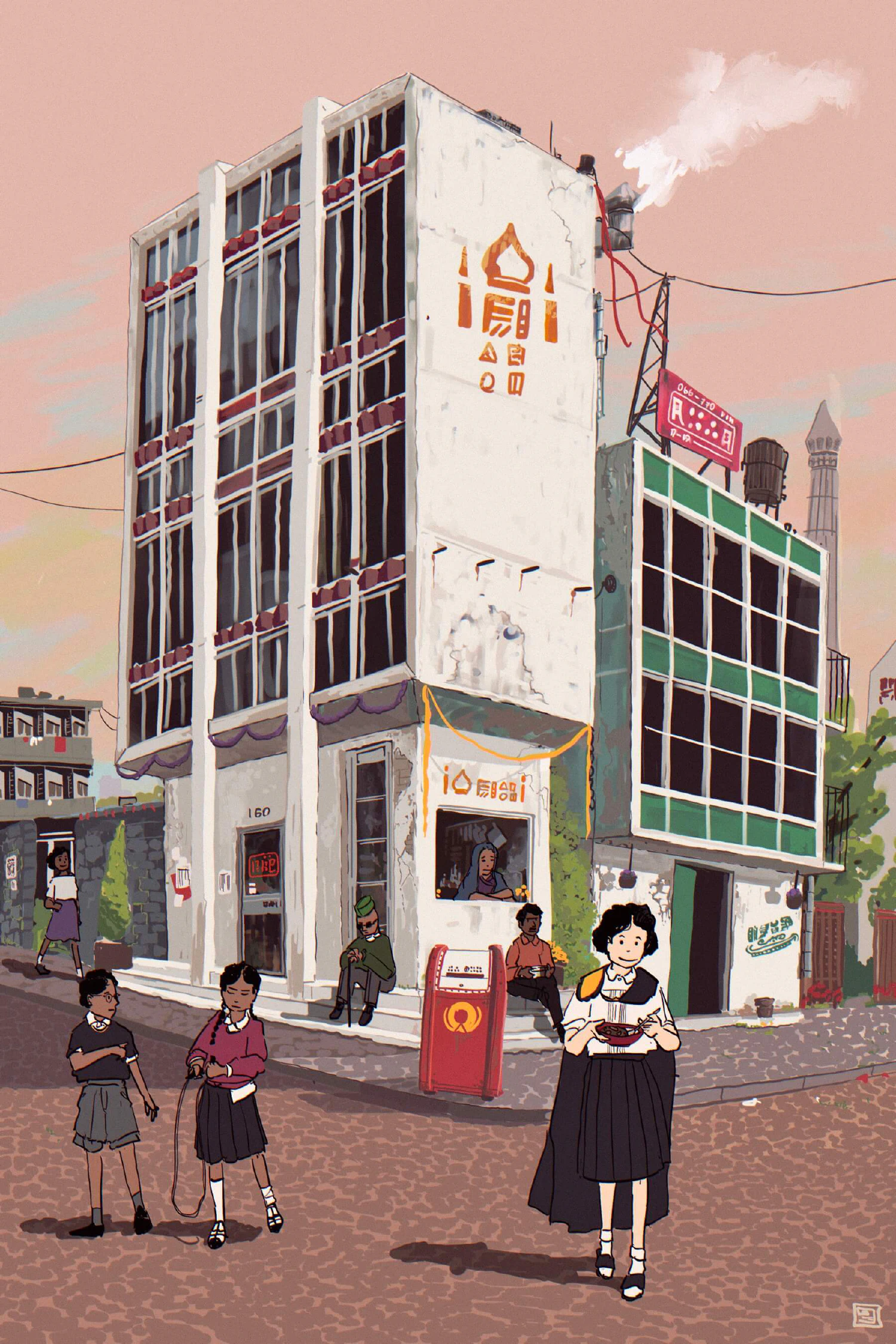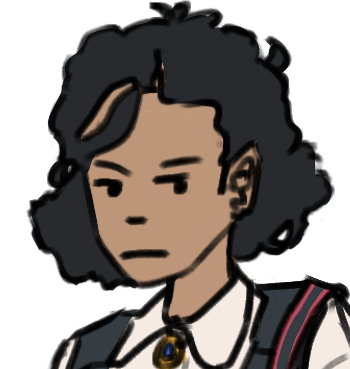NEW Story: Sunday Morning
Little Hyderabad

This article is not part of Vekllei canon. It may be old, obsolete or just a bit of fun.
Little Hyderabad #
Little Hyderabad is a community in the Great Coast, and is one of the few remaining ethnic enclaves in Vekllei’s postwar period. It’s not that immigrants are rare – on the contrary, about half the people you see in the street were born overseas. But the chaos of British occupation was far behind them now, and the government is more considerate in how it scatters immigrants across the boroughs. These dense concentrations of people and culture are rarer today, and that made Little Hyderabad (Petty Hyderabad, in Vekllei pidgin) both intimidating and exotic to girls like Tzipora, who liked people and adventure.
Tzipora had eaten Indian food once before. She had been tricked by some girl – her friend at the time – into trying a mystery beef dish doped with a criminal mix of spices. That girl thought it was funny at first, but Tzipora started crying. Her hands went numb and she thought she was going to die. She didn’t brag about her ‘Colombian spice tolerance’ so much after that.
She was staying over at Ayn’s apartment in the Great Coast when she decided to visit Little Hyderabad, if only for a convenient dinner when Ayn worked late. She wasn’t quite sure what to expect. The neighbourhood was lighted enough and quite low-rise for the Great Coast, but most of the apartments had been built in Occupation and so were tired and sagging in places. She liked that, Seispri was the same. There was this place called the Palace Restaurant which wasn’t really a restaurant at all, but a hole in the wall with someone’s mum sitting in it. It smelled good – really good, but there were these two big Sikh guys chatting casually with her like they knew her. Tzipora sat on the curb and watched them until they left a while later.
She went up to the mum and looked into the gloom for a board with the menu on it. There wasn’t one. The mum asked what kind of curry she liked. Tzipora said she didn’t know. Well – how spicy did she like it?
“Medium – please,” Tzipora said.
It came in a wood bowl that was hot to the touch. She ate it in the street and was nearly struck by a guy on a petrol bike. The taste was so big – it filled your mouth, lighting up all corners of your brain with pleasure. This wasn’t like curry from the tin – it was fresh, and earthy, and foreign-tasting. She was hooked. And smugly, it wasn’t that spicy at all. How’s that for spice tolerance, she thought to herself.
A Note on Cafés in Vekllei #
Society in Vekllei is not particularly more altruistic than anywhere else, so why do people run restaurants in a place with no money? There are a few reasons.
- In Vekllei, land (in part) owns itself, and historical use of the land is generally preserved in transfers of ownership. In practice, this means that a parcel of land with a café also comes with an apartment or cottage attached. These establishments are often central both geographically and socially, and so are highly desirable pieces of real estate. While it is possible to convert a café into a different business, land-ownership is complex in Vekllei and usually goes through the courts. You’ll require either the backing of the municipality or the sovereign (the extrapolated ‘best interest’ of the land metaphysic) to make major renovations to a business, so that renovation is not something to rely on when looking for property.
- Eateries are easy to establish. The Vekllei equivalent of a ‘business loan’ occurs through a meeting with the Sisterbank (officially Petty Bureau Labour Bank of Vekllei), which is driven by the social good in abstract. Food service is a mature industry with straightforward connections to suppliers, so almost anyone can start an eatery after a few meetings with the bank. Food businesses also scale well – evidence of good trade allows you to take out greater loans easily, and unlocks options for both your establishment and your living situation.
- People like doing it. Vekllei is made up of hundreds of thousands of small communities, and a café, bistro or pub is at the heart of all of them. It’s a romantic sort of business that requires hard work, but offers satisfying social rewards – Vekllei people value property stewardship, graciousness and community, and a restauranteur is positioned at the centre of all three. The most well-liked members in many communities are barmen and bakers.
These are all optimistic reasons why people run eateries in Vekllei. It is also true that some hate doing it, but continue regardless – paralysed either by attachment to the location or a legacy or some other social or legal trap. There’s plenty of bad food in Vekllei, too. The overall density of cafés in the country is however something to marvel at, and you’ll notice it immediately upon arrival.
A Funny Appetite #
Tzipora had a difficult relationship with eating, and by the time she got to Vekllei her hunger was all over the place. It was something to do with the psychology of childhood, and how old memories seemed to tell her how to feel years on. She was still picky; she was still food insecure. She would go on these crazy fasts, then overeat for two or three days. And none of it seemed to matter – whether it was her god-given metabolism or a byproduct of GHD, she had weighed exactly 86 pounds for over three years. Which at 58 inches was skinny, but wasn’t half bad considering where she’d come from. The porridge makes ’em short and retarded, as Moise says.
In a girls’ school full of poor girls, everything is for keeps. The dining hall was run as a charity and it was good, but no one was kidding themselves about the sweetbread. Tzipora was told it was the brains of a lamb – it wasn’t brains, it was the pancreas, but what did it matter? There was always spare sweetbread on Tuesdays, but good luck finding second serves of the roast on Sundays. The nun never gave you enough the first time, so you had to swallow it as quick as you could and go back before they ran out.
Even now, in another country on another continent, the nun is still running out of roast. And with every meal, even with her friends, she’s got these freaky sensitivities that strum like a double bass when the menu comes out. No, she won’t share her chips.
Tzipora got really into food in Vekllei. About half of the people in Vekllei came from overseas, so it was a world’s pantry. She tried stuff she’d never had before, and lots of things she didn’t like. She had this vivid memory of eating breakfast with Lin Zhi, and her dad was in his boxers and singlet like he always was, and he brought out some wet fishy rice thing that tasted like it had been scooped fresh out of the Yangtze. She hated it. She ate the whole thing, but she hated it.
